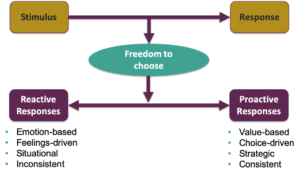“In life, we can’t always control the first arrow. However, the second arrow is our reaction to the first.
The second arrow is optional”
The Buddha
This Buddhist parable explains that life sometimes presents us with situations, events, and circumstances that create pain for us. They are some of life’s inevitable arrows that come our way… misfortune, accidents, loss, separation, illness, bereavement, etc. However anytime this happens, there is also a second arrow that comes along with the first one – and that one is even more painful!
The second arrow is our reaction to the first one. Whilst we can’t always control the first arrow, we can certainly control the second one and avoid unnecessary suffering by choosing to have a different response, one that is more helpful to us.
For example, my employer is making cuts and I get made redundant – this could be an example of a painful life arrow that comes my way, and I can’t control it. However, far more painful than the prospect of being made redundant could be if my thinking dwells on thoughts such as :
- They haven’t made everyone redundant; they must have chosen me for a reason
- They obviously thought I was easily dispensable
- If I’m that dispensable, they probably don’t think much of me anyway
- Maybe I’m not good enough
- I might not find another job very quickly
- I probably don’t have much to offer that is unique or special or really useful to another employer
- That means I’ll find it really hard to find more work
- I’ll probably be out of work for a long time and that’ll affect my CV
- This is going to be awful; I’ll end up in debt now
- What if I never work again!?
The news of redundancy might be painful, but nowhere near as painful as having these kinds of thoughts!
This Buddhist wisdom is also mirrored in stimulus-response theory:

Viktor Frankl said “Between stimulus and response there is a space. In that space is our power to choose our response. In our response lies our growth and our freedom”
When our clients come into coaching, what they may be bringing is that an arrow has hit them. They’ve lost their job, they received difficult feedback from someone, they didn’t get the promotion, a relationship is in trouble or has ended. Sometimes, whether they realise it or not, they also bring the second arrow with them. As Frankl said, between stimulus and response there is a space…and that is the coaching space…
How do we support our clients to avoid or handle the second arrow?
There are many aspects to the ICF Core Competencies that shine a light on how we can support our clients with their “arrow management”. The first thing is to notice and acknowledge the first arrow. These life situations can be truly painful, and we can support our clients by acknowledging and normalising their emotional pain. We encourage client expression and show genuine care and empathy for their feelings of loss, frustration, disappointment, irritation, vulnerability, or whatever it is they are experiencing.
Once the first arrow and the pain associated with it is recognised and honoured, we can then invite our client to notice their reaction to the situation. We can inquire and explore what is their response, how might they describe it and what strikes them about it. We might also inquire how they feel about having those feelings? Perhaps we will offer observational feedback if we notice minimising language, generalisations, catastrophising or limiting beliefs.
Now that the first and the second arrows have been identified and recognised, we can acknowledge the client for their insights and awareness about this situation and the work they are doing around this challenging topic. We can inquire if the client would prefer to have different thoughts and feelings about the situation. If so, what would they be? What would be the response they would like to have about this situation that would be more helpful to them? At this point, we are really opening up that space between stimulus and response! The coaching “space” enables the client to press the pause button and think, feel, reflect, consider and ultimately choose the response they would like to have in a safe, supportive and respectful environment.
“The one thing you can’t take away from me is the way I choose to respond to what you do to me. The last of one’s freedoms is to choose one’s attitude in any given circumstance” Viktor Frankl
Pain is inevitable, and coaching can support people to realise that suffering is indeed optional, and they have other choices available to them.
Coach Advancement by Tracy Sinclair supports organisations to develop the potential of their people through coaching, coaching skills and coaching culture. Our Coaching with Conscience services specialise in offering coaching and coaching related services in support of positive social impact and social progress.

Tracy Sinclair is a multi-award-winning Master Certified Coach (MCC) with the International Coaching Federation (ICF). She is also a trained Coaching Supervisor, Mentor Coach and ICF Assessor. Tracy trains coaches and works with managers and leaders to develop their coaching capability. She works as an international Corporate Executive and Board Level Coach, a leadership development designer and facilitator working with a wide range of organisations. Tracy also specialises in working with organisations to support them develop coaching culture. Tracy has co-authored a book Becoming a Coach: The Essential ICF Guide published in 2020 which provides a comprehensive guide to coaching for coaches at all levels of skill and experience, the psychology that underpins coaching and the updated ICF Core Competency Model. In this same year she founded Coaching with Conscience which exists to have a positive impact on society and our environment through coaching. As part of this work, she collaborates closely with MIND, the UK’s leading mental health charity and the British Paralympic Association (BPA). She also offers pro bono personal development and coaching programmes to young leaders (18-25-yrs). Tracy was named as one of the Leading Global Coach winners of the Thinkers50 Marshall Goldsmith Awards of 2019 and was a finalist for the Thinkers50 Coaching and Mentoring Award in 2021. She won the ICF Impact Award for Distinguished Coach in 2023 and is a member of the Marshall Goldsmith 100 Coaches. She was the President of the UK ICF from 2013-2014 and was an ICF Global Board Director since 2016, serving as Treasurer in 2017, Global Chair in 2018 and Immediate Past Global Chair in 2019 and Vice Chair and Director at Large on the International Coaching Federation Global Enterprise Board in 2021.
Share This Post!
Sign up for additional resources, opportunities and updates!
Delivered straight to your inbox.







